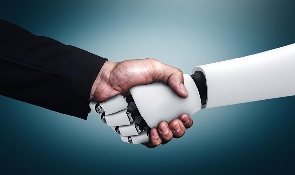Opinions of Wednesday, 29 November 2023
Columnist: Atianashie Miracle A.
The role of artificial intelligence in enhancing educational accessibility and personalised learning experiences
The integration of Artificial Intelligence (AI) in educational settings has sparked a vital conversation about the balance between technology and human connections in schools. While AI offers unparalleled advantages such as personalization of learning, efficient data management, and access to diverse resources, it's crucial to recognize that it cannot and should not replace the
invaluable human interactions that form the cornerstone of education.
Human connections in schools are essential not just for imparting knowledge but for the holistic development of students. Teachers, beyond being conveyors of information, are mentors, role models, and sources of inspiration. They offer emotional support, understand diverse student needs, and foster a safe and nurturing environment. This human element is crucial in developing social skills, empathy, and emotional intelligence in students, aspects that AI cannot replicate.
Moreover, the role of teachers and peers in promoting critical thinking, creativity, and collaborative learning is irreplaceable. Discussions, debates, and teamwork under human guidance encourage students to think independently, express their ideas, and respect diverse perspectives. Such interactions are fundamental in preparing students for the complexities of real-life social and professional environments.
AI, while efficient in delivering customized learning experiences, lacks the intuitive understanding of a student’s emotional and psychological state. Teachers play a pivotal role in identifying and addressing these aspects, which are critical for the overall well-being and development of a student.
Furthermore, education is not just about academic learning; it's also about moral and ethical development. Teachers impart values, ethics, and a sense of responsibility—elements that are deeply rooted in human experiences and cannot be programmed into AI. In essence, while AI can be a powerful tool in enhancing educational experiences, it should be used to complement and not replace human interactions in schools.
The presence and guidance of teachers and the dynamics of peer interactions are indispensable. They provide a balanced environment where students can not only learn but also grow emotionally and socially. The future of education lies in harmoniously blending technology with the irreplaceable human touch, ensuring students receive a well-rounded and meaningful education.













